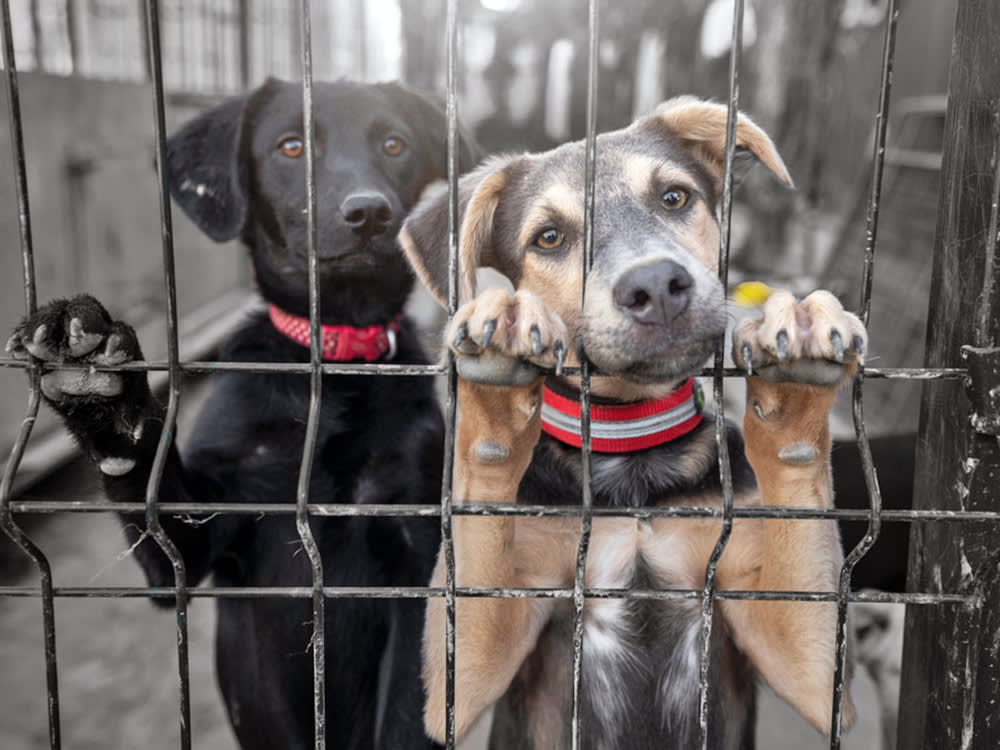Animal Shelters Overwhelmed as ICE Raids Force Families to Leave Pets Behind
It’s a crisis affecting rescues across the country.

Share Article
As immigration crackdowns increase in frequency, animal rescues around the country are facing an influx of surrendered and abandoned animals. A Tampa rescue is the latest animal welfare organization affected by the surge of Immigration and Customs Enforcement (ICE) deportations. Mercy Full Project told Fox 13 Newsopens in new tab that it is taking in a record number of abandoned pets whose guardians were forced to leave the country; according to founder Heydi Acuna, the organization did not anticipate the sheer volume of animals left behind.
“We have these families contacting us to see how we can help because they don’t have a place for the animals,” Acuna said. “It’s a crisis we were not expecting.”
Mercy Full Project has taken in many dogs surrendered by undocumented families who chose to leave the country voluntarily. And then there are the animals abandoned after their guardians were detained and deported. Since ICE is not responsible for any property left in the wake of a raid, pets can sometimes be left alone in empty residences. One such case was Mud, a dog discovered by a neighbor in a backyard weeks after his family was deported suffering from severe skin infections, heartworm, and hookworm.
"His organs are still not working properly," Acuna said. "We’re doing bloodwork and biopsies to try to save him."
Under the Trump administration, raids by ICE have ramped up. Earlier this summer, an LA Timesopens in new tab exposé dove into how mass deportations from ICE raids were leaving cats and dogs homeless across the city. In late June, dog surrenders tripled from the previous year. But not every family can plan ahead, especially given how frequent, unexpected, and sudden the raids can be. That leaves their pets as collateral damage.
“They don’t want to surrender their pets,” Marcia Mayeda,opens in new tab director of animal care and control for the County of Los Angeles, told Forbes. “They love them — they’re family members — but they have no other option. Either they’ve been taken into custody or have to leave, and you can’t just leave the country with a pet on a whim. They have to have medical exams by veterinarians and get a medical health certificate, and depending on what country you go to, they may have other rules and regulations. You can’t just throw them in the car and drive across the border or get on an airplane.”
Even when animals are voluntarily surrendered, shelters and rescues across the country are overpacked and underfunded. Many animal organizations were already dealing with “critical overcrowding”opens in new tab for various reasons, like rising living costs and impulsive COVID-19 adoptions that didn’t pan out.
“It’s already bad, but now on top of that, a lot of requests are because people have disappeared, because people have been deported,” Fabienne Origer, manager of AGWC Rockin’ Rescue, told the LA Times. “It’s just ongoing, every single day.”
The mass abandonment of pets due to ICE raids is happening across the country. From Coloradoopens in new tab and Californiaopens in new tab to Arizonaopens in new tab and New Yorkopens in new tab, wherever mass deportations occur, beloved pets are left behindopens in new tab. There is no formal network in place to care for these animals, but communities are banding together to help.
Back in February, The Guardianopens in new tab ran a piece about the local, word-of-mouth networks that have sprung up to find homes for these animals.
“When people are deported, what happens to their animals is such a small part of the bigger issue,” Kyle Aaron Reese, a New York man who adopted a Bulldog named Benny after his family was deported, told The Guardian. “But if we can take care of the animals, that’s something we can do when we feel like we have little control over everything else.”
It’s a beyond stressful time for everyone involved — the deported families, the shelters and rescues, and the animals themselves. One tangible way to help is to adopt from a shelter; giving an animal a home, no matter where that animal came from, will ensure that the shelters have more space. But if you can’t adopt, donating, volunteering, and fosteringopens in new tab are good alternatives. If you are at risk of deportation, it’s advisable to create a plan with friends and neighbors to find the best way to care for your pets.

Petrana Radulovic
Petrana Radulovic is a New York City-based writer who focuses on entertainment and culture beats. In her free time, she writes fiction, sings karaoke, and tries new recipes. Her work has appeared in Polygon, IGN, Reactor, and more. She lives with a very affectionate cat named Bagel, who loves head kisses and meeting people at parties. He is smart enough to open cabinets but still too dumb to understand stairs.
Related articles
![Sad dog looking outside of cage door.]()
The Most Common Reasons People Surrender Their Pets—And How You Can Help
There are systemic issues at play.
![anonymous woman pampering and taking care about a small ginger kitten]()
6 Ways to Help Local Shelters Without Committing to Full-Time Pet Parenthood
Learn how you can be there for animals in need this National Pet Day.
![Despite being both mentally and physically exhausted, our team in Los Angeles is still showing up to help both the community and shelters in need.]()
How to Adopt or Foster Pets That Have Been Affected by the LA Fires
Show up for the shelters and rescues in need right now.
![Girl sitting on couch hugging her playful dog with the window open to outside]()
7 Myths About Rescue Animals—Debunked
For starters: No, they’re not all traumatized and yes, you can find a purebred puppy at a shelter.
![Couple hug their Pit Bull dog outside on the beach.]()
How to Help the Rescue Pets Who Seem to Be Stuck at Shelters Forever
And why the problem of long-term rescue and foster animals persists.
![Two girls showing off shelter dog paintings.]()
Kids Paint Pet Portraits to Help Shelter Animals Get Adopted
It's a win for everyone involved.





